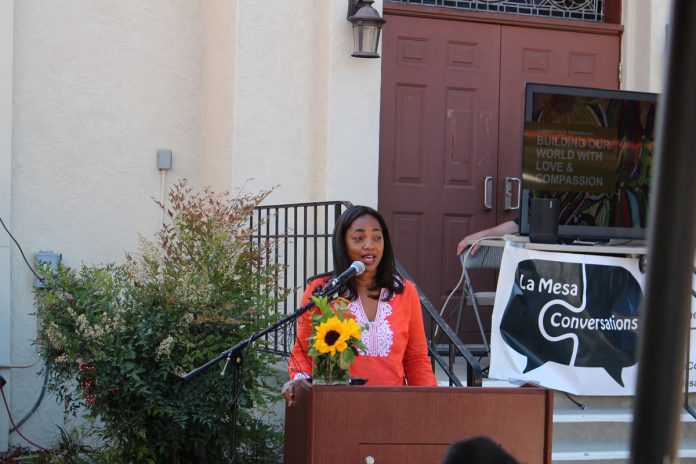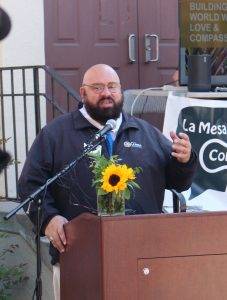
The Day of Remembrance event held at First United Methodist Church in La Mesa on Sunday afternoon was a counterpoint to the protest held in the village a year ago. The scent of jasmine wafted through the air and cheerful sunflowers were placed on tables just three blocks away from where choking smoke lingered around burnt-out buildings a year ago.
The event was not held to commemorate the anniversary of destruction when a peaceful protest turned violent after police and the public clashed but as a day of remembrance to build, as the invitation said, a world “with love and compassion”.

Organized by community groups La Mesa Conversations and Envision La Mesa, who both have strong ties to the artists that painted plywood boards used to board up storefronts in the aftermath of the protest, the event was loosely facilitated by Pastor Christian DeMent.
Secretary of State Shirley Weber and State Assembly District member Akilah Weber briefly spoke to the crowd of about 50 people, and were followed by La Mesa Mayor Mark Arapostathis, Helix High School alumna Asia Duncan, Envision La Mesa organizer Janet Castanos and Executive Director of Movement BE Nate Howard in his keynote speech.
Everything about the event was structured: the rectangular courtyard was deliberately set with chairs in clean lines at straight angles; spoken-word poetry put forth by Howard had an underlying cadence that simultaneously communicated passion and control; the guest list was curated for limited attendance and the speeches were all succinct and focused on growth and grace.
Photographs of the plywood boards were compiled into a slide show presentation set to an upbeat Regina Carter jazz piece and worked the same magic— a call to action— as when volunteers turned out a year ago to adorn shattered storefronts with colorful murals and messages of hope.
“Hatred is a weed that grows best in neglect,” Shirley Weber said, and charged attendees with taking action against destruction ever again befalling the small city.
Her daughter Akilah Weber, who recently left her position on La Mesa City Council to serve in the California Assembly, summed up how the 2020 protest rapidly devolved from a peaceful afternoon event to a night of violence, but focused on the potential for growth that emerged in the aftermath.
“A year ago today, we had a protest that was initially very peaceful and later that evening turned into a lot of pain. Because of who we are, we turned that into a new story. We’re not perfect, but we can strive to be more perfect,” Akilah Weber said.
Arapostathis, a teacher as well as mayor, said he encounters nine-year old students who question ‘Why can’t we all just be kind?” and believes if a school with 1,100 students can achieve that sense of unity then so can La Mesa and society as a whole.
The events of last year, he said, were traumatic for everyone on the City Council because they felt helpless and vulnerable but the aftermath presented a roadmap, “a warning for how events like this can happen when not everyone is heard, when not everyone is included” and revealed a need for purposeful vigilance.
“We need to always remember how we felt the next morning because that is how we need to live our lives… we’re all part of the same humanity,” Arapostathis said.
Briefly, Howard gave his story of getting arrested just days before college graduation for throwing a party with primarily Black students while white students holding a similar party across the street were left to enjoy their celebration in peace.
The real problem at the community level, he said, is microaggressions that result build up until events like last year unfold.
“Our tombstone holds our birth date, our death date and that little hyphen in between,” Howard said, and emphasized that the time in between leaves room for growth, for facing the truth and listening to unacknowledged voices.
DeMent asked members of a faith collective with spiritual leaders from several churches to close the afternoon event and in speaking, they invited everyone to “breathe as you depart today” to fill their lungs with peace, with voices that will not tolerate injustice.
After the event officially ended, community members lingered in the courtyard for conversation. Civic group La Mesa Conversations leader Bonnie Baranoff observed that a year ago, “we felt helpless, felt the tension but knew there was nothing we could do in the middle of the night” and then witnessed so many volunteers turn out to help that the city was transformed by mid-morning.
“Now, everyone is still healing,” Baranoff said but there is learning and positive recognition.













